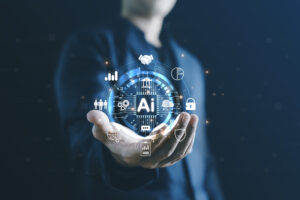As artificial intelligence continues to advance at an unprecedented pace, one area that’s generating significant attention is generative AI. This technology has the power to create content, code, art, and even entire digital environments, revolutionizing the way businesses and industries operate. In 2025, the trends within generative AI are set to transform key sectors, from marketing to healthcare, software development, and beyond. Staying ahead of the curve means understanding these emerging trends and how they’ll impact both business strategies and consumer experiences. Below, we dive into the top 9 generative AI trends that will shape 2025 and discuss how businesses can leverage these advancements to drive innovation and maintain a competitive edge.
1. Increasing Use of AI in Content Creation
One of the most transformative generative AI trends in 2025 is the increasing use of AI for content creation across industries. No longer limited to generating text, AI is now capable of creating multimedia content, such as images, videos, and even interactive designs.
Generative AI models like ChatGPT and DALL·E are being used to automate creative tasks, allowing companies to scale content production without compromising quality. From personalized blog posts to AI-generated social media ads, businesses are leveraging this technology to reach wider audiences at a faster pace.
For instance, media and entertainment companies are using generative AI to create trailers, storyboards, and promotional content, while marketers are generating tailored ads and dynamic websites based on user preferences. This automation reduces the time spent on content production while increasing output, making it a game-changer for industries focused on high-volume content.
However, with great power comes responsibility. As AI-generated content becomes mainstream, there’s growing debate over the authenticity of this material and its potential for misinformation. To mitigate this, businesses must prioritize transparency in their AI processes, ensuring users are aware when content is AI-generated.
2. The Rise of Personalized AI-Generated Experiences
Another trend gaining traction in 2025 is the creation of personalized AI-generated experiences. Generative AI is being used to deliver hyper-personalized recommendations, advertisements, and customer interactions that cater to individual preferences.
For example, eCommerce platforms are using generative AI to create personalized product recommendations based on users’ browsing and purchasing history. AI-generated chatbots offer tailored customer support, while healthcare providers are utilizing AI to craft personalized treatment plans for patients based on their medical data.
In addition to offering a more customized user experience, personalized AI also enhances customer satisfaction and loyalty. However, companies need to strike a balance between personalization and privacy, as excessive use of personal data can lead to concerns around data protection and compliance with regulations like GDPR.
3. Generative AI in Software Development
The use of generative AI in software development is poised to expand dramatically in 2025, offering developers tools to speed up and improve coding processes. AI models such as GitHub Copilot and OpenAI Codex are becoming indispensable in automating repetitive coding tasks, generating suggestions for code completion, and even debugging.
Generative AI enables developers to write cleaner, more efficient code while reducing human error. In some cases, AI can even build software from scratch using natural language prompts. The rise of low-code and no-code platforms further democratizes software development, allowing users with minimal coding experience to create functional applications powered by AI.
By integrating AI into software development, companies can shorten development cycles, lower costs, and produce more robust software. This trend is expected to continue growing, particularly as businesses look for ways to scale development in a cost-efficient manner.
4. Enhanced AI-Generated Art and Design
The role of AI-generated art and design continues to grow, transforming creative industries like fashion, gaming, and advertising. In 2025, generative AI is expected to push the boundaries of digital creativity, enabling artists and designers to create innovative and intricate works faster than ever before.
AI-powered design platforms can generate logos, illustrations, and even entire user interfaces with minimal human input. For example, platforms like Runway and Artbreeder allow users to create art by inputting prompts and guiding the AI to produce unique visual pieces. These tools are being used not only by independent artists but also by companies looking to speed up their creative processes and lower production costs.
However, the rise of AI in art and design has also sparked ethical discussions around creativity and ownership. As AI-generated works become more common, questions about who owns the rights to these creations and how AI will impact traditional creative jobs are becoming more prevalent.
5. Ethical AI: Tackling Bias and Transparency
As generative AI becomes more integrated into our daily lives, the issue of ethics is taking center stage. AI models, by nature, can inherit biases from the datasets on which they are trained, leading to biased outcomes in areas such as hiring, lending, and healthcare.
In 2025, there’s an increasing focus on developing ethical generative AI, which addresses bias, fairness, and transparency in AI-generated content. Researchers and developers are prioritizing efforts to ensure that AI models provide fair outcomes across diverse user groups, making bias detection and mitigation a critical aspect of AI development.
Additionally, transparency in AI decision-making is key to building trust. Businesses using generative AI are expected to be more forthcoming about how their models operate, explaining AI-generated decisions in clear and accessible terms. Regulatory bodies are likely to increase pressure on companies to ensure that their AI systems are not only effective but also ethical and transparent.
6. The Convergence of Generative AI and Virtual Reality
A significant trend to watch in 2025 is the convergence of generative AI and virtual reality (VR). AI is being used to create immersive virtual environments, populate virtual worlds with realistic characters, and enhance user experiences in both virtual and augmented reality spaces.
In gaming, for instance, generative AI is being used to create vast, interactive landscapes and NPCs (non-player characters) that respond to users’ actions in real time. Companies like Meta and NVIDIA are exploring AI-driven VR to bring lifelike realism to the metaverse, allowing users to engage with personalized, dynamic virtual worlds.
Beyond gaming, generative AI is finding applications in industries like real estate, where VR tours powered by AI allow prospective buyers to explore properties virtually, complete with AI-generated furniture layouts and design options.
7. AI-Generated Music and Audio
The creation of AI-generated music and audio is rapidly evolving, with AI models now capable of composing original music, creating sound effects, and even generating voiceovers for various industries. From marketing jingles to soundtracks for films and games, AI-generated audio is making waves in 2025.
Platforms such as Amper Music and AIVA use AI to compose music based on user inputs, offering composers and musicians a collaborative tool that enhances the creative process. In the gaming industry, AI-generated audio is being used to create adaptive soundtracks that change based on in-game actions, offering a more immersive experience for players.
While AI-generated music offers convenience and innovation, there are concerns about how this technology will impact the careers of human musicians and sound engineers. Striking a balance between AI and human creativity will be essential in navigating this evolving landscape.
8. AI-Powered Drug Discovery and Healthcare Solutions
Generative AI is poised to revolutionize drug discovery and healthcare in 2025. By analyzing vast amounts of data, AI models are helping researchers identify potential drug candidates faster and more accurately than traditional methods. This ability to process and interpret complex biological data is speeding up the development of life-saving treatments.
One notable example is the use of AI in developing treatments for COVID-19 and other emerging diseases. Generative AI models can simulate how different drug compounds interact with proteins in the body, helping scientists find new treatments more efficiently.
In addition to drug discovery, generative AI is being used in diagnostics and personalized medicine. AI-generated health reports can provide insights into patients’ conditions, allowing for more accurate diagnoses and tailored treatment plans. This trend will continue to grow as healthcare providers adopt AI to improve patient outcomes.
9. Generative AI for Business Process Automation
The final trend to watch in 2025 is the use of generative AI for business process automation. Businesses are increasingly turning to AI to automate routine tasks, such as customer support, report generation, and data analysis. Chatbots powered by generative AI are being used to handle customer inquiries, while AI tools generate reports based on complex datasets, saving time and reducing human error.
Generative AI is also improving supply chain management by analyzing data to optimize operations and predict disruptions. This automation allows businesses to operate more efficiently and make data-driven decisions, ultimately leading to cost savings and improved productivity.
Industries such as finance, retail, and logistics are already leveraging generative AI to streamline operations, and this trend is expected to expand significantly in 2025.
People Also Ask
What is generative AI, and why is it important?
Generative AI refers to artificial intelligence models that can create new content, such as text, images, music, and code, by learning from existing data. Its importance lies in its ability to automate creative processes, increase productivity, and personalize user experiences across industries.
What industries will be most affected by generative AI in 2025?
Industries such as healthcare, software development, content creation, marketing, and eCommerce are expected to be most impacted by generative AI in 2025. These sectors are adopting AI to improve efficiency, create personalized experiences, and innovate at scale.
How does generative AI create personalized experiences for users?
Generative AI leverages user data and machine learning algorithms to tailor content, recommendations, and interactions to individual preferences. This allows businesses to offer personalized customer experiences in real time.
What ethical concerns are related to generative AI?
The primary ethical concerns surrounding generative AI include bias, transparency, and data privacy. AI models can inherit biases from the data they’re trained on, leading to unfair outcomes. Additionally, businesses must ensure that AI-generated content is transparent and respects user privacy.
How will generative AI impact jobs in 2025?
While generative AI will automate many tasks, it will also create new opportunities for jobs in AI development, oversight, and creative collaboration. The challenge will be balancing automation with human oversight to ensure ethical and effective AI use.
Driving Innovation and Success with Generative AI in 2025
As we move into 2025, generative AI is poised to become even more integral to business and technological innovation. The trends outlined above highlight the transformative power of AI in content creation, personalized experiences, software development, and beyond. However, with great potential also comes the responsibility to address ethical concerns, including bias, transparency, and privacy.
By staying informed and proactive about these generative AI trends, businesses can leverage the technology to drive innovation, improve efficiency, and maintain a competitive edge in their industries. As generative AI continues to evolve, its impact will only grow, reshaping the future of work, creativity, and business processes.
Ready to Leverage Generative AI for Your Business?
Stay ahead of the competition by integrating the latest generative AI solutions into your business strategy. At RTS Labs, we specialize in helping companies harness the power of AI to drive innovation, improve efficiency, and deliver personalized experiences. Visit RTS Labs to learn more about how we can help your organization thrive in the AI-driven future.









